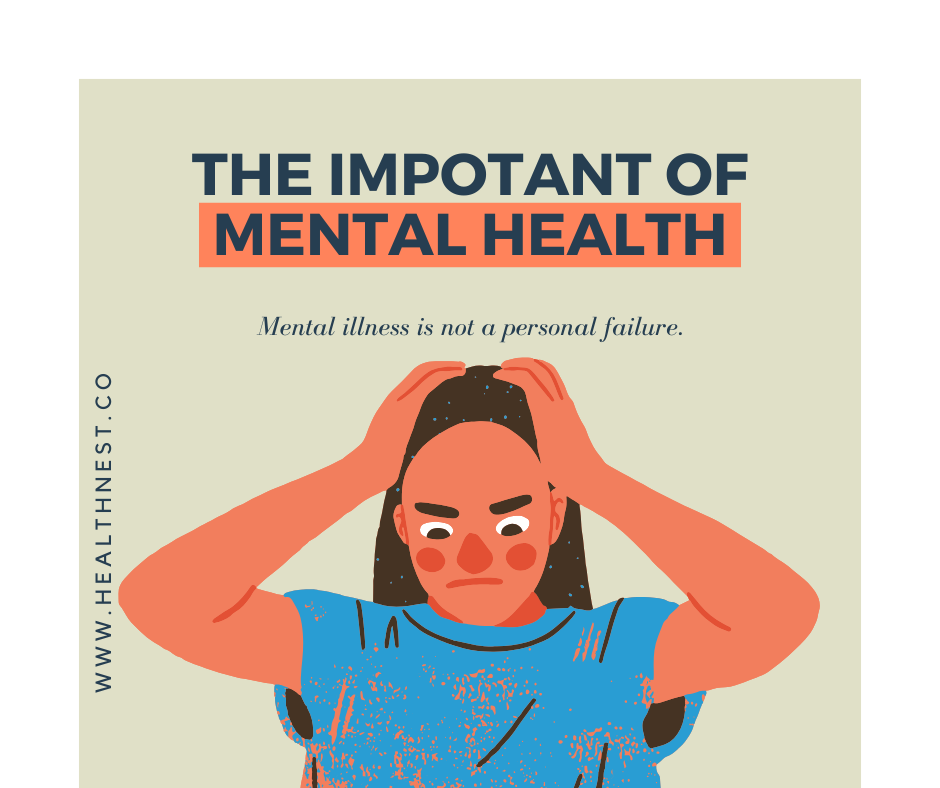The Importance of Mental Health

People commonly ignore mental health which remains crucial to complete wellness though regions and stereotypes persist against it. The actual situation demonstrates that mental health requires equal importance as physical health if not greater importance. People experience thinking differences and emotional variations and behavioral shifts because mental health impacts stress management along with interpersonal relationships and choice making abilities. The following analysis explores mental health importance as well as its obstacles alongside group efforts for mental wellness promotion.
Understanding Mental Health
Every human being possesses emotional and psychological and social aspects that operate as mental health. The state of our mental health controls our emotions and behaviors together with what we feel and think while being essential for facing challenges and creating relationships and accomplishing our objectives. Positive mental well-being surpasses the absence of mental disorders since it presents itself through resilience combined with self-esteem as well as emotional regulation abilities.
Mental health varies throughout a spectrum because all people experience changes in their mental state. Several life events that involve a dear one’s passing and financial strains or strained relationships can result in brief mental health disturbances. Individuals who experience such challenging situations may develop long-term mental health problems which include anxiety disorder and depression and bipolar disorder and schizophrenia.
The Global Burden of Mental Health Issues
Worldwide mental health conditions impact every part of human society including both gender groups as well as diverse cultural communities. The World Health Organization (WHO) reports that mental or neurological disorders will affect one-quarter of the global population during some stage of their lives. Depression stands as the principal force behind global disability rates and suicide ranks because the fourth most common cause of death among people aged 15 to 29 years old.
The widespread occurrence of mental health challenges exists alongside a substantial number of people who choose not to receive help because they experience discrimination and uninformed beliefs about mental health or receive inadequate care from health services. The lack of appropriate treatment helps extend the problems which create additional suffering and decreased well-being together with physical health-related consequences. Persistent anxiety as well as continual stress patterns both lead to increased risks of developing cardiovascular issues and weakened immune response alongside additional physical medical conditions.
The Stigma Surrounding Mental Health
Mental health issues face major obstacles for proper treatment because people hold unfavorable views about such conditions. Society uses stigma to describe the negative social perceptions which exist regarding mental health disorders. Stigma results in social discrimination alongside marginalization which creates hesitation to obtain healthcare help.
Insufficient knowledge about different conditions along with unfamiliarity create the foundation of stigma in society. Mental health disorders seldom reflect weakness or individual failure according to the general public’s misperceptions. The widespread misunderstanding about mental health prevents people from revealing their difficulties while trying to find essential assistance.
Through dialog that breaks social misunderstandings and disputes false generalizations we can develop spaces where people who experience mental health concerns receive beneficial help.
The Impact of Modern Life on Mental Health
Several elements from modern society along with its rapid pace and connectedness work together to reduce our mental health state. The emotional state of people suffers under the combined pressure of work requirements social media influence and cultural demands. Social media gives rise to self-esteem issues because users frequently make unfavorable comparisons to other users. The competitive nature of the workplace environment produces stress resulting in burnout along with anxiety and increased mental fatigue.
The worldwide increase in mental health issues resulted directly from lockdowns combined with social isolation and the unexpected future uncertainties. Research in The Lancet found that the worldwide occurrence of anxiety and depression rose substantially by 25% throughout the first pandemic year. The situation demonstrat
The Role of Resilience in Mental Health
A person’s ability to return to health after facing difficult times constitutes the essential element for sustaining mental well-being. People who demonstrate resilience prove better able to handle stress situations and solve problems along with adapting to new situations. Anyone can learn and improve their resilience because this trait belongs to a category of skills which people can cultivate through time.
The Importance of Early Intervention
Prompt access to support measures stands as the essential factor for handling mental health problems. Timely access to proper mental health assistance enhances recovery potentials for people who seek help. People often avoid seeking mental healthcare because they face discrimination and ignore signs of illness and both problems limit their access to treatment.
Three key domains including schools and workplaces and communities take a crucial part in encouraging early intervention services. Cognitive illness awareness together with accessible medical resources paired with skilled expertise allows individuals to recognize their need for help at the appropriate time. School-based mental health programs recognize issues within children and teenagers early to prevent their problems from growing worse.
The Role of Therapy and Counseling
People can freely disclose and analyze their thoughts as well as feelings and behaviors within a protected environment with complete privacy. Through therapy sessions a professional therapist assists clients to learn adaptive coping mechanisms while discontinuing self-destructive thinking and creates a path towards their objectives.
Cognitive-behavioral therapy (CBT) represents one therapy type among various options that also include dialectical behavior therapy (DBT) and psychodynamic therapy. Therapists modify treatment methods to fit specific patients while achieving excellent results in treating people with mental health problems such as depression and anxiety and trauma.
Online counseling and teletherapy solutions have gained substantial popularity after COVID-19 struck because they provide people with greater access to care. These digital platforms reduce barriers to care thus providing medical support to users who may have limited options.
The Role of Medication in Mental Health Treatment
A small number of people need medications for effective mental health condition management. Medical treatments utilizing psychiatric medications help patients maintain stable brain function through depression medicine and drugs which treat anxiety and stabilize mood properties. Healthcare specialists with qualification must monitor and support medication plans for patients.
Treatment through medication works best when people also pursue therapeutic interventions together with life changes. Mental health outcomes benefit substantially when people follow a habit of exercise and maintain balanced nutrition and achieve proper rest.
The Importance of Self-Care
A person needs to take deliberate measures for preserving their physical condition as well as their emotional state and mental health. Every person chooses self-care methods based on their personal needs through activities which typically combine workouts with mindfulness practice and life journaling and social interaction with family and friends.
Providing care to yourself does not qualify as selfish behavior because self-care serves as a vital element for achieving balance and preventing professional exhaustion. The dedication to self-care allows people to regain their energy and decrease stress so both their energy and daily quality improve.
The Role of Social Support
Social interactions do not always bring positive effects to people. Toxic relationships along with dangerous environments both destroy an individual’s mental well-being. People must work on developing helpful relationships with proper boundary management when needed.
The Role of Employers in Supporting Mental Health
Mental health of employees greatly affects by their professional settings. A beneficial workplace setting enhances employee wellbeing together with work performance and job contentment but intimidating or challenging work settings can trigger mental wellness decline and depression.
To support mental health at their workplace employers need to establish specific work policies and practices which emphasize employee wellness. The workplace implements mental health resources in addition to providing adaptable work arrangements and supports both a welcoming atmosphere along with inclusive practices.
The Role of Government and Policy
The development of mental health care systems depends heavily on government establishment of policies and their financial contributions. Individuals need proper mental health care support so the availability of affordable high-quality services stands as an essential requirement. Although the healthcare system devotes more money and attention to physical health treatment than to mental health care.
There is a necessity for both advocacy and policies which need to resolve mental health care inequalities for building an equitable service framework. The necessary improvements in mental health care include money allocation boosts for treatment services alongside expanded medical service locations and primary health system integration with mental health intervention.
The Role of Technology in Mental Health
Mental health apps provide users with access to three categories of support including guided meditation through digital platforms and system for mood tracking and behavioral exercises for daily mental health assistance.
Users need to proceed with technology usage while showing caution. Digital tools offer benefits to mental healthcare services yet they must never substitute qualified medical treatment. The appropriate utilization of technology demands a solution to privacy issues and quality questions regarding online content to maintain responsibility in its deployment.
The Importance of Cultural Competence in Mental Health Care
Healthcare professionals must demonstrate cultural competence for delivering efficient mental health treatment. Individuals from various cultural backgrounds show different ways their mental health disorders appear while holding personal values which influence their mental well-being.
Mental health professionals should receive training to identify along with honor cultural differences while actively removing prejudices to provide culturally appropriate treatment. Knowledge of systemic racism and how discrimination and social health determinants affect mental well-being stands essential for proper patient care.
The Role of Education in Promoting Mental Health
School curricula that include mental health education allow young people to develop essential mental well-being care abilities. Students need instructions about emotional control and stress management together with methods for constructive coping.

Hi there,
While checking your healthnest.co for its ranks, I have noticed that
there are some toxic links pointing towards it.
Grab your free clean up and improve ranks in no time
https://www.professionalseocleanup.com/
Ask us how we do it:
https://www.professionalseocleanup.com/whatsapp/
Regards
Mike Bjorn Eriksson
Phone: +1 (855) 221-7591